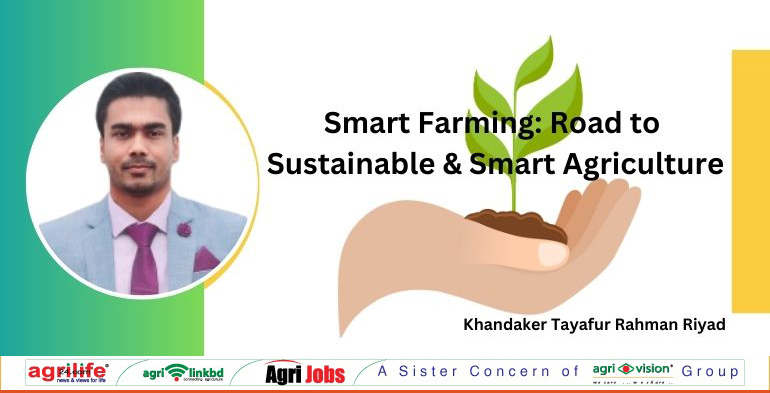
Khandaker Tayafur Rahman Riyad: After the successful actualization of 'Digital Bangladesh' our Honorable Prime Minister Sheikh Hasina has announced recently an inflating new fairy tale to take Bangladesh towards next step which is "Smart Bangladesh."
The goal of achieving smart Bangladesh has been designed based on four pillars. Among them Smart Economy is an important one and there is no alternative to make our agriculture smart if we want to make our agriculture-led economy smart. In this circumstances, Bangladesh can also become a hub of diversified agricultural products significant to the outer world for the production and export of versatile agricultural products which requires smart agriculture and its successful implementation.
'Smart Agriculture' or Climate Smart Agriculture (CSA) is a well-known term to many countries but its concept is still unclear at the farmer level. The concerned departments should take the actions to introduce it. Let's come to the main point, what do we mean by 'smart farming or agriculture'? What is the difference with the existing agricultural system? What are the benefits of smart agriculture? To what extent will 'Smart Agriculture' contribute to built Smart Bangladesh?
Smart agriculture is a fairly new term. Smart agriculture practically includes the use of several technologies aiming to increase the quality and quantity of crops and optimize the human labor used. It will meet the globally accepted three objectives which must be maintained-1. To increase sustainable productivity and income; 2. Resilient adaptation to climate change; 3. Reducing Greenhouse gas and Carbon emissions where possible. Examples of technologies used in smart agriculture are: precision irrigation and precision plant nutrition; climate management and control in greenhouses; Sensors-software platforms for soil, water, light, humidity, temperature management; Positioning systems- GPS, satellites, Communication systems- mobile connectivity; the robot; Analytics and optimization platforms and the connection between all these technologies is the Internet of Things.
It is a mechanism for connecting sensors and machines, resulting in a system that manages the farm based on the data received. These systems allow farmers to monitor their farm processes and make strategic decisions remotely. Can smart farming able to bring any other benefits compared to a conventional method? That question remains for many.
Smart farming enables efficient and equitable flow of information and creates a critical link between all actors in the supply chain to facilitate better decision making & marketing. This balances the power of actors and creates a win-win environment by allowing for a more equitable redistribution of profits throughout the supply chain. Along the supply chain they can identify opportunities to change their production systems to meet the needs of their customers. As a result, the price of their products increases. With detail & additional data in smart farming system farmers are able to implement timely targeted strategies to prevent production losses and increased costs.
The fourth industrial revolution i.e. digital technology has already touched our agriculture. These technological advantages have recently created a revival in agriculture. Gradually its prevalence will increase. Nowadays many online services are growing. Due to the effect of these, the agricultural economy has started to undergo major changes. A large number of tech-savvy youth are taking up agribusiness. The notable fact is: Increasing investment in agriculture is only substitute to attain smart agriculture.
All in all, it has to say that by making smart farming practices available, it is possible to establish 'Smart Agriculture.' It is envisaged that sustainable 'smart agriculture' will play a leading role in building our next vision "Smart Bangladesh."
Writer is a President of Bangladesh Agricultural University Student League.





















